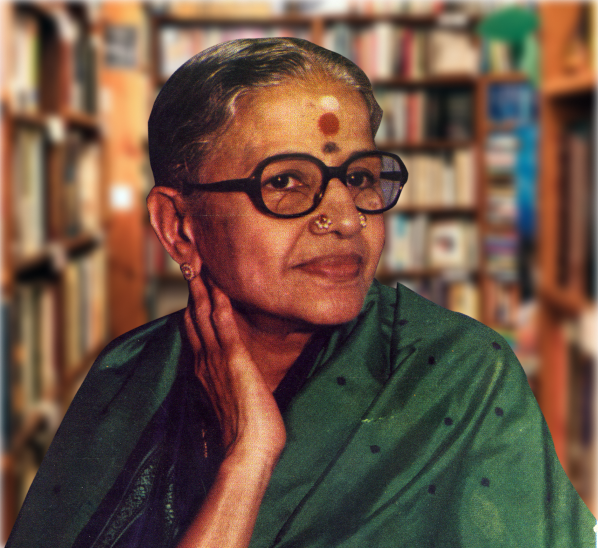Exacting purists acknowledge Srimati M. S. SUBBULAKSHMI as the leading exponent of classical and semi-classical songs in the Karnataka tradition of South India. They and ordinary people alike find in the compelling melody and sweetness of her bhajans, or folk spirituals, deep, pure and abstract emotional appeal, transporting them to a sense of unity with the supreme deity. Rooted in millenia of Indian culture and mythology, her bhajans are a means of prayer and solace in the villages where bhakti marg, or the way of devotion, supersedes more intellectual philosophies.
The gift of song that reaches the hearts of her countrymen results from a passionate pursuit of artistic excellence. As a girl of 10, in the South Indian cultural center of Madurai where she was born in 1916, SUBBULAKSHMI began accompanying her celebrated mothers singing and veena playing. An enchanting voice, hard work, exacting discipline, character, humility and willingness to learn from everyone, made her at the age of 17 a soloist in her own right. When, at the age of 24, she married T. Sadasivam now publisher of the prestigious Tamil weekly, Kalki, in Madras she gained also her friend, philosopher and guide.
As, with maturing years, SUBBULAKSHMIs versatility encompassed Hindustani classics of North India and folk songs of many regions, her following grew far beyond the South; wider audiences first heard her in the film Meera. Mahatma Gandhi asked only to hear her sing “Hari Tuma Haro, or Thou God,” on his 78th birthday, which proved tragically to be his last. Jawaharlal Nehru, after hearing her sing, said, Who am I, a mere Prime Minister, before a Queen of Song?
On tours abroad SUBBULAKSHMI sang at the Edinburgh International Music Festival and before the United Nations. Her vocal filigree, traversing three octaves, and fidelity to tone and rhythm reached through to listeners unfamiliar with melodic Indian music that neither needs nor implies harmony.
In April 1944, after five successful benefit performances given for the Memorial Fund honoring Gandhis wife, Kasturba, SUBBULAKSHMI voice became an instrument for public causes. Receipts of concert halls filled to overflowing and open amphitheaters ”often packed with tens of thousands paying only four annas each (three U.S. cents) so as to deny no one the joy of her songs” have been given to constructive works. Equivalent to over one million U.S. dollars, her contributions have benefited foundations for the poor, hospitals, orphanages, schools, and music and journalism institutes. While becoming the idol of millions, this lady has remained deeply religious, unpretentious and almost childlike in her simplicity.
In electing Srimati M. S. SUBBULAKSHMI to receive the 1974 Ramon Magsaysay Award for Public Service, the Board of Trustees recognizes her exalting rendition of devotional song and magnanimous support of numerous public causes in India over four decades.
I feel deeply honored to be receiving this Award and I accept the honor in all humility.
I am extremely happy to have come to this beautiful country. I find the landscape enchanting with its beach, green lawns and avenues, and the people cheerful, friendly and hospitable. I feel not only quite at home but that we are of one family.
Your great President Ramon Magsaysay was a shining personality and leader who had arisen in our midst in this part of Asia. We knew of the ideals of personal integrity, the sense of truth and justice, that he strove to establish in the short time he was your president. I offer my salutations to him. I also offer my salutations to your national hero Dr. Jose P. Rizal.
Naturally my reverential memory now hovers around Mahatma Gandhi who was the apostle of Peace on Earth, beloved Sri Jawaharlal Nehru, the first Prime Minister of the Indian Republic, and Chakravarti Rajagopalachari, affectionately called Rajaji. It was my singular good fortune to have come under the loving spell of all three. I offer my deepest homage to this trinity.
My all I owe to my husband, Sri T. Sadasivam. By his loving care he is my parent; by his unerring guidance he is my preceptor.
Indian music is orientated solely to the end of divine communion. If I have done something in this respect, it is entirely due to the Grace of the Almighty who has chosen my humble self as a tool. But He is beyond my gratitude. Yet, in a way, I take Him to have come within my reach in the benign personality of the Sage of Kanchi, His Holiness Sri Chandrasekharendra Saraswathi Sankaracharya, who is divinity in flesh and blood, now in his 81st year. I offer my obeisance to the Sage from the core of my being, and pray that he bless me to deserve the honor done to me.
Once again, I wish to express to you all my deep sense of gratitude for honoring me with this Award.

